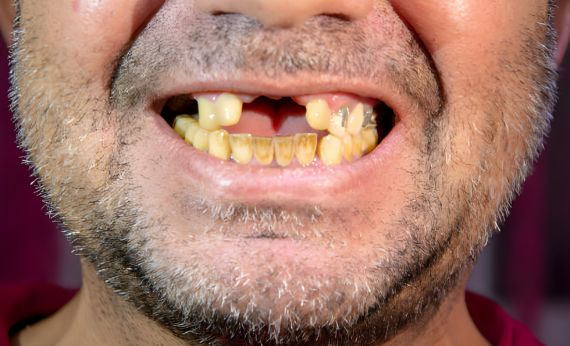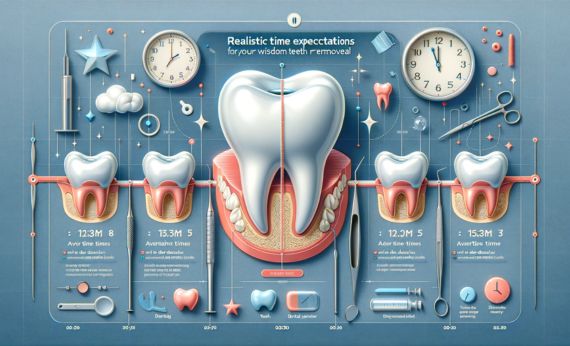Ever wondered how long wisdom teeth surgery takes? This essential procedure, often shrouded in mystery, varies in duration. In this comprehensive guide, we’ll unravel the factors influencing surgery time, preparing you for what to expect from this common yet significant dental milestone.
Curious About Duration of Wisdom Teeth Removal Procedure?
Schedule a consultation today to discuss your concerns and learn more about the wisdom teeth extraction process
Schedule Appointment NowWhat Are Wisdom Teeth and Why Remove Them?
What Are Wisdom Teeth?
Wisdom teeth, also known as third molars, are the last set of teeth to develop in your mouth, typically emerging in your late teens or early twenties. These teeth are located at the very back of your mouth, two on the top and two on the bottom. For some people, wisdom teeth emerge without any problems and align nicely with the other teeth. However, in many cases, they can cause complications.
Why Remove Wisdom Teeth?
The removal of wisdom teeth is often necessary due to several potential issues:
Impaction: Wisdom teeth are notorious for becoming impacted, meaning they cannot fully emerge through the gum line due to lack of space or misalignment. This can lead to pain, swelling, and infection.
Overcrowding: In many mouths, there simply isn’t enough room for these extra teeth. This overcrowding can disrupt the alignment of your existing teeth, leading to orthodontic problems.
Hygiene Difficulties: Due to their location at the back of the mouth, wisdom teeth can be challenging to clean properly. This difficulty in maintaining oral hygiene can lead to tooth decay, gum disease, and other oral health issues.
Cysts and Tumors: Impacted wisdom teeth can lead to the formation of cysts or, in rare cases, tumors. These can cause damage to the jawbone and surrounding teeth.
Link to Surgery Duration
The necessity to remove wisdom teeth directly impacts the duration of the surgery. Factors such as the degree of impaction, the angle at which the teeth are growing, and the overall oral health of the patient can significantly vary the complexity and length of the procedure.
For instance, a fully erupted wisdom tooth may require a straightforward extraction, taking less time, whereas an impacted tooth might necessitate a more complex surgical approach, extending the duration of the surgery.
Pre-Surgery Assessment and Its Role in Determining Surgery Duration

The pre-surgery assessment is a critical step in planning for wisdom teeth removal, playing a significant role in determining the estimated duration of the surgery.
Consultation with a Dental Professional
Before the surgery, a consultation with a dentist or oral surgeon is essential. During this meeting, the professional will evaluate the patient’s dental health and take necessary imaging tests, like X-rays or CT scans. These images are crucial for understanding the position and growth pattern of the wisdom teeth.
Understanding Individual Oral Anatomy
Every patient’s mouth is unique. The positioning of the wisdom teeth, whether they are impacted or erupted, and the angle at which they are growing can greatly vary from one individual to another. This diversity directly influences how straightforward or complex the extraction will be.
Evaluating Potential Complications
The pre-surgery assessment helps in identifying potential complications. For instance, if a wisdom tooth is close to a nerve or if there’s a high risk of infection, the surgeon might plan for a more cautious and methodical approach, which can increase the surgery time.
Customizing the Surgical Plan
Based on the assessment, the oral surgeon will develop a customized surgical plan, which includes deciding on the type of anesthesia and the surgical technique to be used. The complexity of this plan is a key determinant of how long the surgery will take.
Setting Patient Expectations
Finally, this assessment phase is crucial for setting realistic expectations with the patient. By understanding the specifics of their case, patients can be better prepared for the actual duration of the surgery, helping to alleviate anxiety and ensure they have made necessary arrangements for recovery time.
Wonder what to eat after tooth removal read our guide!
The Surgery Process and Time Factors

Understanding the surgery process for wisdom teeth removal is key to comprehending how various stages contribute to the overall duration. Here’s a detailed breakdown:
1. Anesthesia Administration
Duration: Varies from a few minutes to 30 minutes.
Process: The type of anesthesia (local, sedation, or general) is administered based on the complexity of the case and patient preference.
Impact on Duration: The time taken for anesthesia to take effect can vary. General anesthesia or sedation requires more time for administration and for the patient to become fully unconscious.
2. Incision and Exposure
Duration: Approximately 10-20 minutes per tooth.
Process: The oral surgeon makes an incision in the gum tissue to expose the tooth and bone. If the tooth is impacted, additional bone might need to be removed.
Impact on Duration: The complexity of the impaction (e.g., depth, angle of tooth) can extend this phase. More complex cases require more careful and time-consuming work to expose the tooth fully.
3. Tooth Sectioning and Removal
Duration: About 10-30 minutes per tooth.
Process: The surgeon may need to divide the tooth into sections for easier removal, especially if it’s impacted or in a difficult position.
Impact on Duration: The time taken depends on the tooth’s position and root formation. Teeth with multiple roots or unusual root formations might take longer to remove.
4. Cleaning and Debridement of the Site
Duration: Around 5-10 minutes per site.
Process: Once the tooth is removed, the surgeon cleans the site to remove any debris or bone fragments.
Impact on Duration: If there’s an infection or significant debris, additional time may be required to thoroughly clean the area.
5. Stitching and Closure
Duration: Approximately 10-15 minutes.
Process: The surgeon sutures the incision to promote healing. Stitches might be dissolvable or may require removal after a few days.
Impact on Duration: The size of the incision and the type of stitching technique can affect this stage’s length. Larger incisions or more complex suturing techniques may take more time.
6. Post-Surgery Care Instructions
Duration: Usually about 5-10 minutes.
Process: After the surgery, the patient receives instructions for post-operative care.
Impact on Duration: This stage is generally consistent in time but is crucial for successful recovery.
In total, the surgery for a single wisdom tooth can range from 35 to 75 minutes, but this can increase with additional teeth or complexities. It’s important to note that these time frames are approximate and can vary based on the individual patient’s circumstances and the surgeon’s experience and technique.
Factors Influencing the Length of Wisdom Teeth Surgery

The duration of wisdom teeth surgery can be influenced by several key factors. Understanding these can help in estimating the time a particular surgery might take. Here’s an in-depth look:
1. Number of Teeth Being Removed
- Impact on Duration: The more wisdom teeth needing removal, the longer the surgery typically takes. Removing all four wisdom teeth generally takes longer than extracting just one or two.
- Synchronization with Surgery Stages: Each additional tooth requires repeating the stages of incision, removal, cleaning, and stitching, proportionally increasing the total surgery time.
2. Complexity of the Case
- Types of Complexity: Includes the degree of impaction, the angle of the teeth, and the proximity to nerves or other structures.
- Impact on Duration: More complex cases, such as deeply impacted teeth or teeth entangled with nerves, require more careful and time-consuming surgical techniques.
- Synchronization with Surgery Stages: Complex cases may extend the time for incision and exposure, tooth sectioning and removal, and cleaning of the site.
3. Patient’s Oral Health
- Factors: Includes the condition of the gums and jawbone, the presence of infections or cysts, and overall dental health.
- Impact on Duration: Poor oral health may complicate the surgery and recovery, potentially leading to longer surgery time, especially in cleaning and preparing the site.
- Synchronization with Surgery Stages: Issues like infection can increase the time for cleaning the site and require more extensive measures to ensure complete removal of affected tissue.
4. Type of Anesthesia
- Options: Local anesthesia, sedation, or general anesthesia.
- Impact on Duration: The type of anesthesia chosen can influence the length of the surgery. General anesthesia, for instance, might require additional time for administration and recovery.
- Synchronization with Surgery Stages: Anesthesia choice impacts the initial stage of the surgery. For instance, procedures under general anesthesia may take longer to start due to the preparation and monitoring required.
5. Surgeon’s Experience and Technique
- Impact on Duration: Experienced surgeons might complete the surgery more quickly and efficiently, whereas less experienced surgeons might take a more cautious approach.
- Synchronization with Surgery Stages: A surgeon’s proficiency can affect the speed at each stage of the surgery, particularly during tooth sectioning and removal, and stitching.
6. Patient’s Response to Surgery
- Factors: Includes the patient’s tolerance to anesthesia and their body’s response to the surgical procedure.
- Impact on Duration: Some patients might require longer to stabilize under anesthesia or might have a slower response to surgical interventions.
- Synchronization with Surgery Stages: This particularly affects the anesthesia and post-surgery stages, where patient response can vary.
Also read: How long can teeth whitening last
Realistic Time Expectations for Wisdom Teeth Removal

When planning for wisdom teeth surgery, it’s helpful to have realistic expectations regarding the time it might take. Here are average time ranges for different scenarios:
1. Simple Extraction
- Scenario: This applies to wisdom teeth that have fully erupted and are not impacted.
- Average Time Range: Approximately 20-30 minutes per tooth.
2. Complex Surgery for Impacted Teeth
- Scenario: Involves teeth that are partially or fully impacted, requiring more extensive surgical intervention.
- Average Time Range: Can take 40-60 minutes per tooth, depending on the complexity.
3. Multiple Teeth Removal
- Scenario: When more than one wisdom tooth is being removed in the same session.
- Average Time Range: Removing all four wisdom teeth in one session typically takes about 1.5 to 2.5 hours in total.
4. Additional Factors
- Considerations: Time may vary based on individual factors such as the patient’s oral health, the surgeon’s technique, and the type of anesthesia used.
Post-Surgery Recovery: Time and Care
Understanding the recovery process following wisdom teeth surgery, and how the duration of the surgery impacts this phase, is crucial for patients. Recovery time and care requirements can vary based on the complexity and length of the procedure.
Impact of Surgery Duration on Recovery
- Increased Swelling and Discomfort: Extended surgical times, especially in complex extractions, often lead to more significant swelling and discomfort post-surgery.
- Extended Healing Process: The more invasive the procedure, the longer it might take for the surgical sites to heal completely.
- Risk of Complications: Longer surgical procedures can slightly increase the risk of complications such as dry socket or infection, which in turn can extend the recovery period.
- Shorter, Simpler Procedures:
- Quicker Initial Recovery: Simpler extractions typically result in a faster initial recovery phase, with reduced pain and swelling.
- Shorter Healing Time: Less invasive procedures generally lead to a quicker overall healing process.
General Recovery Timeline
- First 24-48 Hours:
- This period is critical for managing bleeding and swelling. Patients are advised to rest and follow post-operative instructions closely.
- Activities should be limited, and a soft food diet is recommended.
- First Week:
- Swelling and discomfort usually peak within the first two to three days before gradually diminishing.
- Patients can typically return to normal, non-strenuous activities after a few days but should still avoid rigorous exercise or activities that might dislodge the blood clot at the extraction site.
- Two Weeks to One Month:
- Most patients will see significant improvement and can resume most activities.
- Complete healing of the gums can take a few weeks to a month, though it can be longer in cases of more complex surgeries.
Factors Affecting Recovery
- Patient’s Age and Health: Younger patients and those in good health typically recover faster.
- Oral Hygiene: Good oral hygiene practices post-surgery can aid in faster and more complication-free healing.
- Following Post-Operative Instructions: Strict adherence to the surgeon’s post-operative care instructions is crucial for a smooth recovery.
Post-Surgery Care Tips
- Rest: Ensure adequate rest, particularly in the first few days post-surgery.
- Ice Packs: Apply ice packs to the cheek to help reduce swelling.
- Medication: Take prescribed pain relief and antibiotics as directed.
- Diet: Stick to a soft or liquid diet initially, gradually reintroducing solid foods as comfort permits.
- Oral Hygiene: Gentle rinsing with salt water can help keep the area clean.
Potential Risks and Complications

Wisdom teeth surgery, like any surgical procedure, carries certain risks and potential complications. Being aware of these helps in understanding the importance of following post-operative instructions to minimize risks.
Common Risks and Complications:
Infection: Possible at the site of the surgery, particularly if post-operative care instructions are not followed properly.
Dry Socket: Occurs when a blood clot fails to form or is dislodged from the socket where the tooth was removed, leading to delayed healing and increased pain.
Bleeding: Some bleeding is normal, but excessive bleeding can be a complication.
Nerve Damage: Rare but can occur, especially in lower wisdom tooth extractions, leading to numbness or altered sensation.
Swelling and Bruising: Common after surgery, but excessive swelling or bruising can be indicative of complications.
Reaction to Anesthesia: While generally safe, some patients may have adverse reactions to anesthesia.
Minimizing Risks:
- Strict Adherence to Post-Operative Instructions: This includes guidelines on oral hygiene, diet, activities, and medication usage.
- Timely Communication with the Surgeon: Patients should promptly report any unusual symptoms or concerns following the surgery.
- Proper Preparation: Understanding the surgery and recovery process can help in better adherence to care instructions and identification of potential issues.
- Regular Follow-Up Appointments: Attending scheduled post-operative appointments allows for monitoring of the healing process and early detection of any complications.
Takeaway
Wisdom teeth surgery time varies based on factors like tooth complexity and oral health. Understanding this, alongside potential risks and the importance of post-operative care, prepares patients for a smoother surgical experience and recovery.
Learn about: The complete lifespan of dental bridges


